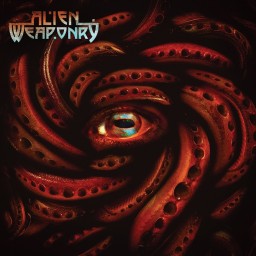 Review by Shadowdoom9 (Andi) for Alien Weaponry - Tangaroa (2021)
Review by Shadowdoom9 (Andi) for Alien Weaponry - Tangaroa (2021)
Ask any modern metalhead who likes young bands that mix metal with native influences who their favorite band is, and the common answer would be Alien Weaponry. This New Zealand band shook the world with their Maori brand of thrashy groove/alt-metal. Their work has been praised in countries like the U.S. and Finland. 3 years after their debut Tu, the band has presented a new album, Tangaroa. And it might just come close to surpassing Trivium's In the Court of the Dragon as my best album of 2021!
Alien Weaponry is not just about writing riffs and creating the best music they could make, it's about their local art and culture. They goal is to make sure Maori culture is heard of beyond New Zealand. While some songs are in English, many others take on the Maori language, or as they like to call it, te reo. With lyrical themes of history, colonialism, and the environment, they're almost like a less progressive and more historical Gojira. And the language perfectly matches the metal rhythm. The riff groove is certainly what you gotta look out for that balance.
The opening track "Titokowaru" (18) starts with some Maori warriors chanting while rowing their boat over stormy seas. Then the storm becomes pummeling as fast riff groove comes in. The verses have a simple melody that pushes along like when those warriors push their oars, as the seas have different layers. It also fits well for a gym workout. An excellent boat-rower! "Hatupatu" (Struggle) is where the rhythms get more progressive and the riffing has more aggression, already taking on some Gojira vibes. There's some tribal depth in the drums, and the kit is really handled with care. Lots of interesting rhythm to add to the atmosphere. Next up, "Ahi Ka" (Burning Fires) is the first single of the album, released only under a year after Tu. It seems picks up stylistically where Tu left off. In 1952, while preparing for Her Majesty Queen Elizabeth II's visit to Auckland, the City Council thought they would make the city look more beautiful by exiling Ngāti Whātua people from their homes and burning down their village. The dark music is in perfect fit with that tragic event. The title track is about how marine wildlife is suffering climate change and fishermen wanting to grab endangered species. The band start adding in some English lyrics, for anglophone fans to follow. Alien Weaponry and Gojira can really raise environmental awareness while staying aggressive.
The slow progressive "Unforgiving" has lyrics of mental health. Frontman Lewis de Jong seems to have written those lyrics in his perspective with his heart-piercing vocals. The song sounds a bit jazzy in some places, but it's all part of the band's interesting direction of different horizons. Then "Blinded" switches gears to the band's groove side, as the crushing riffs and drums drive through. That single came out as early as "Ahi Ka", two months after that single. The te reo lyrics are on again with their next track "Kai Whatu" (People Food) (wait, that's almost the same translation as "Kai Tangata"), which is worth great headbanging. From the long heavy intro with tribal percussion, you know you're in for a killer track. There's even some extreme prog there in terms of the overall sound, with some distance in the vocal range. Next track "Crooked Monsters" has more ambience, starting with a two-minute psychedelic intro. Lots of experimentation here, including complex riffing and the vocals that only appear in the second half.
The ultimate heavy highlight here "Buried Underground", more of a nu-ish groove metal track. You can mosh along to that opening riff in live performances. "Dad" has another one of the best intro riffs. De Jong performs some more of his intriguing vocals in different styles, and he isn't breaking boundaries, he's expanding them! Lots of emotional aggression in his voice, along with the vocals of bassist Ethan Trembath. Then we have another mostly instrumental track, "Ihenga" (Ratio). As the album is reaching its end, the band decided to add as many indigenous vibes as they could with their instruments and songs. And did I say this track is mostly instrumental? Yes, the vocals don't appear until the 3-minute mark is a strong beautiful section of te reo vocal choirs. Just close your eyes and visualize a Maori land with all your knowledge of the culture and region. And finally, "Down the Rabbit Hole" regains some Gojira vibes in the riffing and atmosphere. It's slightly more industrial-sounding and less progressive, but the vibes are still there. For any metalheads wanting Alien Weaponry and Gojira to tour together, their dream has come true with an American tour in support of the album.
Well, there you go! Another perfect addition to the discography of a band that has made up for the lack of desired authenticity from other bands. Alien Weaponry has made their sound big with an organic lookback at their culture. All equally sharing their moments are all the instruments and vocals. Bass groove, drumming aggression, riff melody and vocal power are all keys to the sound. I've already mentioned the sounds of sailing through water at the very start of the album, and they really fit in with the theme. By the time, we reach the next decade, the band will already be close to age 30 and probably reach at last album #5, and they'll remember the strong history they've made with their first two albums. But for now, they continue to rule the modern metal world and will unleash the moshing monsters, with the glory of this perfect offering by their side!
Favorites: "Titokowaru", "Ahi Ka", "Tangaroa", "Kai Whatu", "Buried Underground", "Dad"
